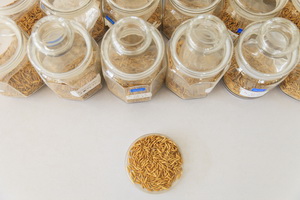
Salt Tolerant Rice Variety Developed in India
April 24, 2019| |
 Scientists from Bose Institute in Kolkata, India developed a salt tolerant transgenic rice variety which, under greenhouse conditions, showed normal growth and grain yield.
Scientists from Bose Institute in Kolkata, India developed a salt tolerant transgenic rice variety which, under greenhouse conditions, showed normal growth and grain yield.
The scientists used genes from the wild rice species Porteresia coarctata. This species, native to some parts of South Asia, is known to be a halophyte, thus a rich source of salt stress tolerance genes. They were able to identify a gene, PcINO1, that codes for a salt-tolerant enzyme that synthesizes inositol even in the presence of salt. Inositol is a vitamin-like substance that acts as a stress-ameliorator and a switch to pathways important for communicating salt tolerance. By overexpressing PcINO1 into the commonly used IR64 indica rice variety, they developed a new variety that can withstand up to 200mcmol per Li of salt, or about half as saline as seawater. According to the head scientist, this may also indicate that the manipulation of inositol metabolic pathway may be one way to combat salt stress in plants.
The significance of the new findings is important to the development of plant varieties that can survive salinity and drought as concerns and discussions about global climate change become more apparent.
Read the full article in Scientific Reports.
| |
Biotech Updates is a weekly newsletter of ISAAA, a not-for-profit organization. It is distributed for free to over 22,000 subscribers worldwide to inform them about the key developments in biosciences, especially in biotechnology. Your support will help us in our mission to feed the world with knowledge. You can help by donating as little as $10.
-
See more articles:
-
News from Around the World
- Scientists Race to Save Bananas from Panama Disease
- Researchers Use Order Theory to Show the Connection Between CO2 Emission and GM Crops
- Scientists Discover Ways to Regenerate Plant Tissues
- Japanese Health Ministry Finalizes Policy on Genome-Edited Food Products
- Australian OGTR Grants Permit to GM Wheat Field Trial
- Knowing How Cells Grow and Divide Leads to More Robust and Productive Plants
-
Research Highlights
- LncRNA Controls Susceptibility to Cry1Ac in Pink Bollworm
- Salt Tolerant Rice Variety Developed in India
-
Beyond Crop Biotech
- NTU Researchers Genetically Modify Key Protein in Plants to Increase Seed Oil Yield
- Scientists Explore Consumer Response to Health Information Campaigns and Genetically Modified Food Labels
-
Announcements
- CRISPRcon 2019
- CBU Subscriber Survey
-
Plant
- Simple Method for Rapid Screening of CRISPR-Cas9-Induced Mutants
- Experts Release Protocol for Creating Large Chromosomal Deletions in Rice Using CRISPR-Cas9
-
Read the latest: - Biotech Updates (January 28, 2026)
- Gene Editing Supplement (January 28, 2026)
- Gene Drive Supplement (February 22, 2023)
-
Subscribe to BU: - Share
- Tweet
